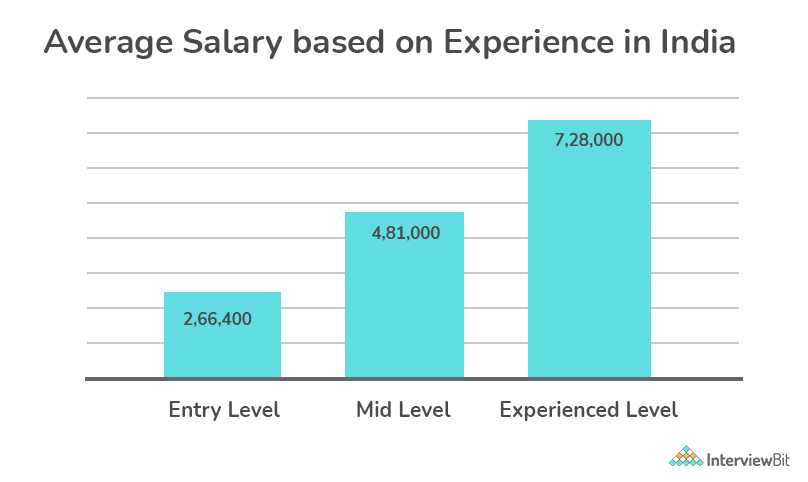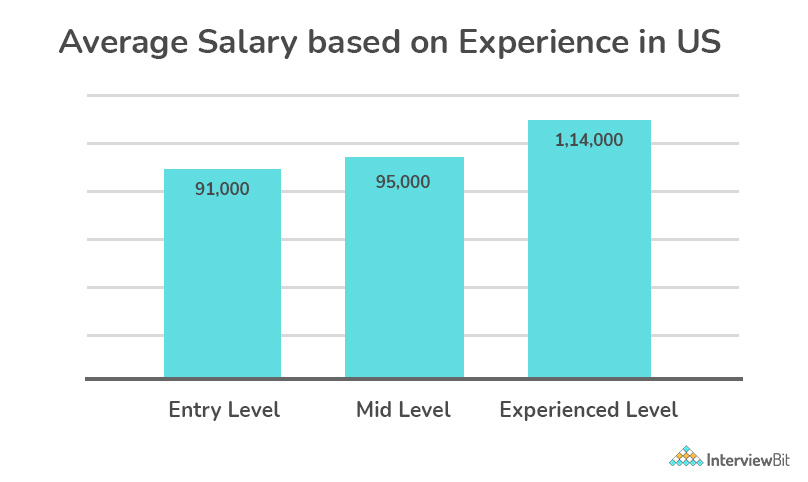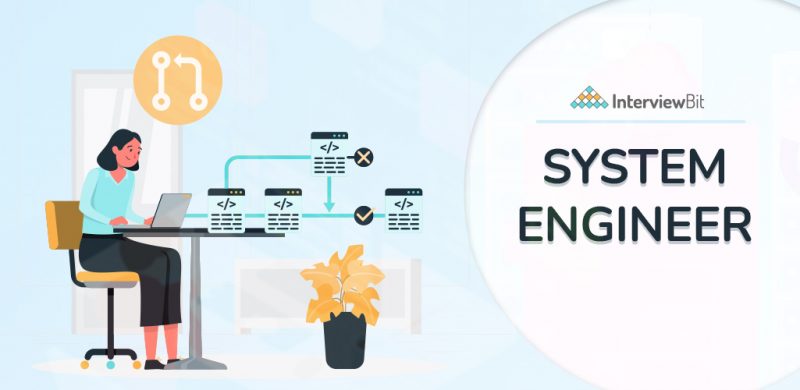- Who is a System Engineer?
- System Engineer Salary
- Skills Required to Become System Engineer
- System Engineer Job Description
- System Engineer Resume
- Top Companies Hiring for System Engineers in India
- How To Prepare For System Engineer Interviews
- Conclusion
- Frequently Asked Questions
- Q.1: What does a system engineer do?
- Q.2: Is Systems Engineering a Good Career?
- Q.3: What are the skills required for a System Engineer?
- Q.4: Do Systems Engineers code?
- Q.5: Is System Engineering hard?
- Q.6: Is System Engineering stressful?
- Q.7: Which is better Software Engineer or System Engineer?
- Q.8: Is System Engineering an Important Role?
- Q.9: Who are the people a Systems Engineer works with on a daily basis?
Who is a System Engineer?
System engineering is all about building, managing, and analyzing a composite system. It follows the principles to organize the whole system by keeping an eye on each phase throughout the lifecycle of any system. It can be in any domain like technology, chemical, mechanical, etc.
For example, in an aeroplane, the mechanical part of it is handled by a mechanical engineer, the electrical part is handled by the electrical engineer, the hardware part is managed by the computer engineer, and the software part is taken care of by software engineers. The person who deals with all these engineers is the System Engineer.
System Engineers have some expertise in all these categories and they make sure that everything is in place and working together to provide us with the best product. They play a vital role in the IT world. A system engineer coordinates with the engineering crew and project managers to analyze and develop systems. They are like a primary source of communication to interlink different teams in an organization. You may think of them as a conductor in an orchestra who is responsible for keeping its musician at a proper level to give melodious outputs.
Confused about your next job?
These engineers prepare a proper plan to organize different domains, do measurable risk assessments, and regularly concentrate on maintenance, performance, testing, and budgets. They may share a similar title i.e. “System Engineer” but their task may vary. The ultimate goal is to precisely analyze all the delays and risks to enable a smooth production process.
We will look into more skills that are needed as a system engineer inside the subheading in this blog. Let’s dive into the world of System engineers.

System Engineer Salary
The salary of system engineers depends on several factors like experience, company, location, and skills. We will discuss the two most important factors that are salary by experience and by location:
1. Salary Based On Experience
Experience plays a vital role in terms of settling a salary structure. The amount of knowledge decides the amount in your account and knowledge comes with experience. The better the knowledge, the more you will earn.
- Entry-level engineers: Engineers at this level have experience of 0-2 years. The average salary in India is approximately Rs. 2,66,400 per annum; in the US, it’s $91,000 per annum.
- Mid-level engineers: Engineers at this level have experience of 3-5 years. In India, the average salary is approximately Rs. 4,81,000 per annum and in the US, it’s $95,000 per annum.
- Experienced level engineers: Engineers at this level have experience of 6+ years. In India, the average salary is approximately Rs. 7,28,000 per annum and in the US, it’s $114,000 per annum.


2. Salary Based On Location
In India, the average salary of a system engineer is Rs. 5,09,000 per annum. Following are the salaries of system engineers in various cities.
| Cities | Average Salary (per annum) |
|---|---|
| Noida, Uttar Pradesh | Rs. 8,38,812 |
| Hyderabad, Telangana | Rs. 7,42,138 |
| Chennai, Tamil Nadu | Rs. 6,37,624 |
| Bengaluru, Karnataka | Rs. 5,62,643 |
| Mumbai, Maharashtra | Rs. 4,93,813 |
| Mysore, Karnataka | Rs. 4,17,719 |
| Pune, Maharashtra | Rs. 3,82,708 |
| Gurgaon, Haryana | Rs. 3,47,314 |

In the US, the average salary of a system engineer is $96,220. Following are the salaries of system engineers in various cities.
| Cities | Average Salary (per annum) |
|---|---|
| San Jose, CA | $126,383 |
| Washington, DC | $117,130 |
| Chantilly, VA | $106,680 |
| New York, NY | $104,223 |
| San Diego, CA | $102,187 |
| Denver, CO | $101,292 |
| Atlanta, GA | $89,096 |
| Huntsville, AL | $87,832 |

3. Salary Based On Company
Following are the companies that pay decent salaries to their system engineers in India:
| Company | Average Salary (per annum) |
|---|---|
| Intel | Rs. 12,55,880 |
| Qualcomm | Rs. 12,34,000 |
| Siemens | Rs. 7,10,000 |
| Cerner | Rs. 6,60,000 |
| XL Dynamics Pvt Ltd | Rs. 5,35,565 |
| Tata Consultancy Services | Rs. 4,54,842 |
| AMCAT | Rs. 4,47,087 |
| CGI Group | Rs. 4,43,484 |
| Tech Mahindra | Rs. 4,07,359 |
| Wipro | Rs. 4,04,000 |
| Infosys | Rs. 3,90,000 |
Following are the companies that pay decent salaries to their system engineers in US:
| Company | Average Salary (per annum) |
|---|---|
| Visa | $139,544 |
| Los Alamos National Laboratory | $135,106 |
| Micron Technology Inc. | $131,479 |
| Bay Area Rapid Transit | $130,707 |
| Cisco | $130,230 |
| Spectrum | $129,782 |
| VMWare | $129,136 |
| NASA | $124,313 |
| Brocade Services | $117,272 |
| Zscaler | $115,509 |
| UMB Financial | $114,783 |
Read More – Highest Paying Jobs In India
Skills Required to Become System Engineer
There are no particular steps to become a system engineer, it all depends on how much you are dedicated and open to learning. Every day there is a discovery. It is very important to keep yourself updated. The only thing that matters is consistency in your learning. Here are some of the basic steps to get you involved in this field:
- Learn the Technical Skills: Following skills are required for a system engineer: Information security and integration skills, Asset management skills, Strong mathematical concepts, Knowledge of Application Development, Analytical and Decision-making skills, Knowledge in System Design, Understanding of networks in the system, Experience with hardware and software, Software development skills are a must, Documentation skills, Communication skills.
- Know the Fundamentals: You need to learn concepts of various domains that are involved in building a system.
- Get familiar with the tools: They are the helping hands while building a system, so it is necessary to learn about different tools that are frequently used. Tools like Innoslate, TeamCenter, MagicDraw, Enterprise Architect, Vitech Core, etc.
- Understand real-world scenarios: The hours you spend learning system concepts will be beneficial only if you use them in the practical world. It is very important to relate your knowledge to a real-world problem because the ultimate goal is to solve a problem with a better solution.
- Prepare yourself based on the questions that could be possibly asked by the recruiter, we have mentioned some questions below in this blog.
- Recognize your end goal: It is important to have a clear vision about what you want to include in a system to fulfil the client’s requirements.
- And last but not least, your time, patience, and dedication to learning and exploring the problems will give you a better understanding.
Now let’s look into the educational qualification required for a system engineer:
- Most of the roles need a bachelor’s or related degree in the field of computer science, or similar fields.
- The advanced level requires a master’s degree or PhD in system engineering or related fields.
- There are various certifications in this field that could be used as a plus point for getting a job.
Sometimes when you apply for senior-level roles as a system engineer, companies might get influenced by your score in system engineering professional exams, so it’s beneficial to take various exams that are well-known in this field, one of them being the Fundamentals of Engineering Exam.
This exam includes topics like mathematics, probability, statistics, engineering economics, system modelling, and system design. This can be the first step toward your professional career as a system engineer.
System Engineer Job Description
In this section, we will be covering all the expectations of a system engineer. Roles and responsibilities for this role may vary for different companies. Some typical responsibilities are as follows:
- Ensure that all installed systems and infrastructure are managed and monitored on an ongoing basis.
- Providing support for the installation, configuration, testing, and maintenance of OS, application software, and system management tools.
- Assuring the highest levels of uptime and availability for systems and infrastructure.
- Test and maintain the operating systems, system management tools, and application software.
- Design complex and efficient process systems.
- Preparing catalogues that list requirements.
- Take proper security measures for the systems.
- Be ready with backup in case of any urgencies.
- Write custom scripts to increase the efficiency of systems and this could reduce human intervention.
- Provide different levels of support to the team.
- Risk management for critical issues.
- Constantly monitor the application performance, identify the solution for the possible problems, and coordinate with the development team to incorporate those fixes.
- Ensure that security strategies, backup strategies, and redundancy plans are in place.
- Assist in the design and development of information systems and operational support systems.
- Also, assist vendors and other IT personnel in resolving problems.
System Engineers are also hired based on their experience:
- Entry-level engineers: 0-2 years of experience which may include internships
- Mid-level engineers: 2-5 years of experience
- Senior-level/Advanced-level engineers: 6+ years of experience.
Responsibilities increase as per the level of role you apply for. Now let’s have a look at the basic requirements for a system engineer.
- BS/MS degree in computer science or related fields.
- Experience in installing, configuring, and troubleshooting UNIX-based environments.
- Strong knowledge of coding and scripting.
- Basic understanding of cloud platforms, preferably AWS.
- Experience in monitoring the systems.
- Experience in automation software like Chef, Puppet, etc.
- Strong communication skills.
- Strong decision-making ability.
- Broader technical understanding of the systems.
- Project management skills.
- Expertise in coding and scripting languages like shell scripts, Perl, Ruby, and Python.
- Virtualization and containerization experience, such as VMware, VirtualBox, and similar programs, would be advantageous.
- Having solid network knowledge such as OSI network layers and TCP/IP protocols.
Let’s have a look at the sample job description for a system engineer at Amazon.
Job Description
We’re looking for a Systems Development Engineer to own automation, scaling, and solving operations with software across our platforms. This will include identifying and resolving issues, automating and improving repetitive processes, and working closely with the development team to identify operational needs. You will become intimately familiar with the architecture of our systems, and be responsible for diving deep into code while developing solutions for our customers and services. You’ll drive prioritization of operational issues, and drive automation design & scaling requirements in support of the wider organization. You will get the opportunity to work closely with a great team of software developers who will help you grow (and also learn things from you).
Basic Qualifications
- Candidates with Bachelors/ Masters in Computer Science or Engineering or related field.
- Excellent problem-solving and troubleshooting skills.
- Possess an extremely sound understanding of areas in the basic areas of Computer Science such as Algorithms, Data Structures, Object Oriented Design, and Databases.
- Be able to write Amazon quality code in an object-oriented language – preferably in C/C++/Java in a Linux environment.
- The candidate must have soft skills like leadership, teamwork and collaboration, flexibility, and adaptability.
Preferred Qualifications
- System engineering experience in the cloud.
- Strong, object-oriented design and coding skills (C/C++ and/or Java preferably on a UNIX or Linux platform).
- Knowledge of Perl or other scripting languages is a plus.
- Experience with distributed (multi-tiered) systems, algorithms, and relational databases.
- You must be a good problem solver.
- Ability to effectively articulate technical challenges and solutions.
- Deal well with ambiguous/undefined problems; ability to think abstractly.
- Strong metrics and operational excellence focus and proven ability to deep dive into issues.
System Engineer Resume

For any job role, the foremost thing is to send your resume to any company. So you must know the art of resume writing to get qualified for further interview rounds. Here is some data about resume analysis.
A recruiter spends an average time of 4-6 seconds scanning a resume and concluding whether it was worth calling this candidate for an interview. Approximately 80% of resumes get rejected by the automatic systems known as Applicant Tracking System (ATS) based on various filters. Here are few tips to build a resume:
- Choose the correct format.
- Try to use keywords that are present in the job description given by the company in your resume. This doesn’t mean that you should flaunt the skills you are not aware of.
- Use bullet points instead of paragraphs, and avoid putting your photograph.
- Use the same font throughout the resume.
- Use an active voice.
- Use online tools like Grammarly to avoid spell checks and grammatical errors.
- Put the correct system engineering skills in your resume.
- List your most impressive accomplishments first.
- Your resume should mainly focus on your machine learning skills, one should not get diverted to the things that are not part of the job description until it’s important to show.
- Use simple and small sentences to deliver your descriptions, interviewers avoid looking into long sentences.
Listed below are a few things that you should avoid when writing a resume:
- Photograph in the resume header.
- Irrelevant certification
- Long summary section
- Vague descriptions about your projects or experience.
Top Companies Hiring for System Engineers in India
System engineering is a highly demanded profession in industries as well as in government. They are an essential resource for the technical development and maintenance of complex systems. Some of the top recruiters who actively hire System Engineers are as follows:
- Tata Consultancy Services (TCS)
- IBM
- Cognizant Technology Solutions
- Tech Mahindra
- NVIDIA
- Salesforce
- EPAM
- Accenture
- Qualcomm
- Persistent Systems
- FactSet
- Verizon
In addition to the IT industry, there are a number of other industries that need system engineers. Some of these industries include:
- Defence industry: Companies like ESSI Security and Defence, and Mistral Solutions fall in this category.
- Aerospace industry: Companies like York Space Systems, Syncroness, and Boeing fall in this category.
- Electronics industry: Companies like Qualcomm, PiServe, and Tesla fall in this category.
- The reason for the high demand for system engineers is that they combine all the engineering department input into a system to maximize production. They figure out how to make things better by avoiding waste of time, manpower, money, material, and other resources.
How To Prepare For System Engineer Interviews
The primary skills of the system engineer are to design, integrate and manage complex applications. They work at the core of all the other engineers, so one needs to be highly attentive, creative, and active in dealing with different resources in the company that is involved in the lifecycle of the particular system. Companies look for candidates who can provide effective solutions for the system’s issues on time.
Let’s look into some of the general interview questions along with the answer structure that is asked in system engineer interviews.
What are the roles of a system engineer?
Some interviewers wanted to be sure whether the candidates are familiar with the role they are applying for. At this point, they might decide if it’s well-versed to proceed with the interview process or not. So answer it smartly.
Do you have an interest in learning and exploring new technologies?
Here you can mention how you keep yourself up to date with the new technologies that are part of your role. You can also mention the technical training that you take to increase your knowledge.
Have you worked as a team lead before, if yes, how was your experience?
If you have been a team leader before, then you can mention what approaches you use to increase the sales of the company, and what was your role in achieving a specific goal. Just try to highlight your success story within that team and if you faced any obstacle, how did you overcome it.
Read More – System Engineer Interview Questions
Let’s look into some technical questions that can be asked in the interviews:
- How did you manage any system configurations?
- If a website slows down, how would you troubleshoot that issue?
- What are containerization and virtualization?
- Which is the best automation software for Windows and Linux?
- What is the concept of demand paging?
- What is thrashing and when does it occur?
- What does it mean by starvation in the OS?
- Explain the concept of the root partition.
- How much expertise do you have to prepare technical documentation of the system?
- How good are your debugging skills?
Tips:
- You must have a solid technical background with good troubleshooting skills.
- You should be comfortable with working on automation software and scripts.
- Try to come up with examples of real-world scenarios while answering about the solution to a problem.
- Don’t hesitate while answer a question
Conclusion
The demand for system engineers is there in national as well as international markets. They are a vital part of most companies. CNN (Cable News Network Inc.) ranks Systems Engineering as one of the top 50 jobs in the U.S (in terms of pay and quality of life), and the Bureau of Labor Statistics predicts a faster-than-average 10-percent growth rate in employment opportunities for Industrial engineers, including System Engineers, by 2026. So choosing this as your profession can be the best decision based on your interest.
Frequently Asked Questions
Q.1: What does a system engineer do?
Ans: System engineers help in building the products based on the client’s requirements and ensure that they run properly. Their day-to-day work may differ on various factors like additional requirements, deadlines, etc. As already discussed in the blog, system engineers create and design various complex systems by coordinating with different domain people.
Q.2: Is Systems Engineering a Good Career?
Ans: System Engineer is one of the highly demanded career options. If you are comfortable with learning the skills that we have mentioned in the blog as a beginner or you are already well-versed with these skills, then this is a good career option for you.
Q.3: What are the skills required for a System Engineer?
Ans: The following are the top skills required for a system engineer:
- Problem-solving skills
- Proficiency in data architecture
- Programming skills
- Knowledge of cloud computing
- Experience with virtualization viz. VMware, Virtual Box
- Network experience viz. TCP/IP
- Communication skills
- Customer service
- Time management skills
- System designing skills
Q.4: Do Systems Engineers code?
Ans: Sometimes system engineers do work similar to software engineers, so they need to learn to code to perform software-based tasks in the systems.
Q.5: Is System Engineering hard?
Ans: The answer to this question is based on the company you are working in. This is a challenging job, not only do you need to deal with your task but you also have to keep an eye on the task that is done by other teams for the system you are working for.
Q.6: Is System Engineering stressful?
Ans: Things get stressful in the following scenarios:
- You don’t have your full team support
- Made critical mistakes near the deadline.
- Demotivated team leaders.
- Becoming anxious because of incomplete tasks.
Q.7: Which is better Software Engineer or System Engineer?
Ans: Both the roles have their importance, you can decide your role based on the skills you have or are easy to learn for you.
The system engineer is the one who manages the overall lifecycle of the system development. It mainly focuses on the physical aspects of the system, on the other hand, software engineers are responsible for developing software-based applications.
Q.8: Is System Engineering an Important Role?
Ans: Yes, they play a vital role in the industry. They help managers to have a better understanding of the client’s needs. They are responsible to make coordination between the teams which enables them to run different processes smoothly.
Q.9: Who are the people a Systems Engineer works with on a daily basis?
Ans: System Engineers often assist Project Managers in dealing with complex issues during system development, while acting as the final point of contact to ensure all issues are addressed as soon as possible.







 Join WhatsApp Group
Join WhatsApp Group


